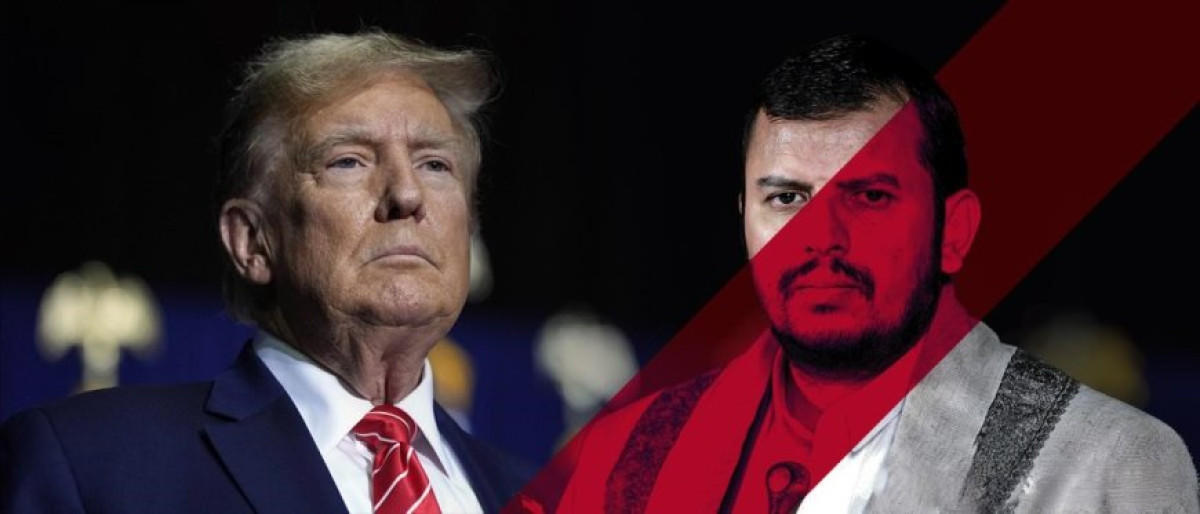Implications of Donald Trump's Return to the White House for the Houthis
- 16 Nov 2024


The potential return of former U.S. President Donald Trump to the White House raises a series of critical questions regarding the strategic approach he may adopt in the Middle East, particularly toward the Houthi movement in Yemen. Analysts are closely examining whether Trump would mirror his predecessor, Joe Biden’s strategy of containment and deterrence or shift toward a more aggressive stance against the Houthis. This scenario is unique due to a convergence of factors, chief among them being Trump’s potential re-entry amid one of the region's most volatile periods in recent years. Such a backdrop underscores the urgency in assessing Trump's likely approach to the enduring wars and escalating tensions across the Middle East. Key questions arise as to whether his campaign promises—albeit vague—about ending the war reflect an authentic policy direction or whether they were tactical statements aimed at securing political support.
Houthi Calculations Regarding Trump's Return
Following the U.S. election and Trump’s hypothetical victory, Houthi leader Abdul-Malik al-Houthi addressed the outcome, offering a stark perspective on America’s role in the region ( ). America has taken on the role of supporting and partnering with the Israeli enemy alongside Britain,” al-Houthi remarked, highlighting what he views as a combination of colonial ambitions and religious motivations within U.S. foreign policy. He elaborated, “U.S. presidents have alternated in serving the Israeli enemy and the Zionist project. Biden openly declared his belief in the Zionist project, which targets Arab lands, resources, and holy sites. Trump, however, has taken pride in accomplishing what previous U.S. presidents could not, presenting specific achievements for Israel."
Al-Houthi went on to assert, "Trump declared his readiness to offer Israel more Arab land, and he meant exactly what he said. This is the reality of the Americans." He accused Trump of perceiving wealthy Arab states as mere “cash cows” and disregarding poorer nations, reducing his view of them to what he claimed was "nothing but death and destruction."
In general, the Houthis' reaction to Trump's potential return is shaped not by his personal characteristics or specific policies but by the broader strategic shifts his presidency could introduce to the Middle East. Several indicators illuminate this hypothesis:
1- Houthi Engagement in the Ongoing Escalation
The Houthis' active involvement in regional conflicts and ongoing escalations is fueled by two primary factors. First, they view the confrontation as part of a larger front supporting Gaza, and now, Lebanon as well. Second, their escalation began with expressions of solidarity for the "Al-Aqsa Flood" operation, eventually leading to military actions in the Red Sea and areas near Israel’s periphery and coast. This progression culminated in direct, sporadic confrontations with Israel, as illustrated by the Houthi strike on Tel Aviv on July 19, 2024. Israel's response, in turn, aligned with the scale and scope of Houthi actions, often relying on allied support, notably from the U.S. and the U.K., or through direct operations such as the Israeli assault on Hudaydah Port on July 20, 2024. These dynamics suggest that the Houthi front remains a secondary, albeit strategic, concern for Israel, acting as a support axis for the Houthis themselves. This assessment underscores the view that the developments will likely influence the future trajectory of this front in Gaza and Lebanon.
2- Gains for the Houthis
A critical factor reinforcing this assessment is the Houthi movement's various gains from its engagement in the escalation. These advantages span multiple levels. Domestically and regionally, the Houthis have garnered stronger support by aligning themselves with the Palestinian cause, a move evidenced by sustained pro-Palestinian demonstrations in Houthi-controlled cities that express solidarity with Palestinians and Lebanese. Additionally, the escalation serves as a diversion from pressing internal crises, including economic and social hardships within Houthi territories. Since October 7, 2023, the Houthis have intensified their alignment with the Iranian axis, securing significant economic, logistical, and military benefits for the medium and long term. These developments also provide the Houthis with leverage in any potential political settlement concerning Yemen’s future, where their role in the regional escalation could prove influential.
3- U.S. Approaches and the Houthi Response
An analysis of Trump’s approach during his first term, contrasted with Biden’s current strategy, yields critical insights into U.S.-Houthi dynamics. Trump’s strategy was characterised by efforts to minimise confrontations with the Houthis, employing U.S. forces or regional allies. This approach included exerting pressure on the Houthis by designating them as a Foreign Terrorist Organization (FTO). Biden, in contrast, initially pursued a containment policy by lifting the FTO designation and advocating for a comprehensive settlement. However, this stance shifted as Houthi escalations intensified, prompting the U.S. to increase its reliance on targeted precision strikes against Houthi-held areas and form new alliances, such as the "Prosperity Guard" coalition in the Red Sea. Eventually, the Biden administration re-designated the Houthis as a “Specially Designated Global Terrorist Entity”—a more measured classification than Trump’s original FTO designation, though still an indicator of a firmer U.S. position against Houthi activities.
When evaluating the impact of U.S. strategies—whether during Trump’s first term or Biden’s current presidency—it becomes clear that neither administration's military nor political approaches have successfully deterred the Houthi movement or advanced a settlement in Yemen. Under Trump, the 2018 Stockholm Agreement provided a strategic opportunity for the Houthis to consolidate their hold on controlled areas and secure additional weapons from Iran. Meanwhile, during Biden’s term, the Houthis have largely resisted external pressures despite various U.S. initiatives that included both military and diplomatic efforts. Thus, the implications of the upcoming U.S. elections on the Houthis are less about Trump’s characteristics and more about the policies he may implement toward the group and his stance on the intensifying Middle East conflict.
The Determining Factors Influencing Trump's Approach
Donald Trump’s hallmark unpredictability and sudden shift tendencies complicate forecasting his potential policies. However, a plausible assumption is that his stance in a new presidential term would not simply replicate his previous approach. This is due to shifting dynamics in both the global and regional arenas, evolving conditions within the U.S., and even personal changes within Trump himself. Until Trump officially assumes office in January, the main factors influencing his policy direction will likely include his business-oriented mindset, focus on “deals,” and prior experience in the White House. Based on these assumptions, several potential approaches toward the Houthis can be hypothesised:
1. Reduced U.S. Involvement in Combating the Houthi Group
Following Trump’s electoral victory, Robert F. Kennedy Jr.—a prominent political figure closely aligned with Trump and expected to have a significant role in the administration—stated, “Trump intends to withdraw U.S. forces from Syria and refrain from maintaining a military presence there.” During his campaign, ( ) Trump emphasised that his priority would be a robust U.S. military focused on domestic defence. Interpreting these statements, particularly in light of Trump’s prior term, suggests he is inclined to reduce direct military engagement in foreign conflicts. This implies that Trump may avoid direct military action against the Houthis and favour alternative strategies.
2. The Possibility of Supporting a Major Deal to End Escalation
A defining trait of Trump’s approach is his pragmatic, transactional mindset, centring on deals and the calculus of gains and losses. Recently, Trump asserted that ending the Gaza war with an Israeli victory would mark a significant political success as he re-enters office. Some reports claim that, during a meeting with Israeli Prime Minister Netanyahu in July 2024, Trump indicated his intention to resolve the Gaza conflict upon assuming office in January 2025. Considering the costs of prolonging the war, especially for the U.S., it is plausible Trump might pursue a comprehensive deal to de-escalate the region, potentially encompassing the Houthi involvement in the Red Sea conflict.
Such a deal would likely include multi-layered agreements with regional and Arab stakeholders, addressing the “post-war” landscape in Gaza and Lebanon. Trump may also aim to advance the Abraham Accords, particularly regarding Saudi-Israeli normalisation, while seeking to resolve the Yemen conflict in alignment with Saudi interests. In this context, Trump could employ his “maximum pressure” strategy to drive these objectives forward.
3. Relying on the “Maximum Pressure” Strategy
To avoid the costs associated with direct military confrontation with the Houthis and Iran, President Trump may turn to his hallmark “maximum pressure” strategy. This would compel the Yemeni group to reduce its escalatory actions and potentially move toward a comprehensive settlement in Yemen. Such a strategy could involve an extensive economic sanctions campaign, as well as designating the Houthis as a Foreign Terrorist Organization, similar to the treatment of groups like al-Qaeda.
In conclusion, Trump’s return to the White House presents a range of scenarios for U.S. policy toward the Houthis in Yemen. However, it is clear that simply replicating the strategies of either Trump’s or Joe Biden’s prior administrations—without substantial, realistic settlements in the region that address both de-escalation and the pressure needed to bring the Houthis toward a comprehensive political resolution—will be ineffective in deterring the group or achieving meaningful progress on the Yemeni issue.
[1] الحوثي يعلق على فوز ترامب في انتخابات الرئاسة الأمريكية ويوضح خطوات "أنصار الله" المستقبلية، روسيا اليوم، 7 نوفمبر 2024، متاح على:
https://linksshortcut.com/UtdvQ
[1] روبرت أف كندي جونيور: ترامب يعتزم سحب القوات الأميركية من سوريا، الحرة، 9 نوفمبر 2024، متاح على:
https://linksshortcut.com/KJXml
The stated views express the views of the author and do not necessarily reflect the views of the Center or the work team.
Comments